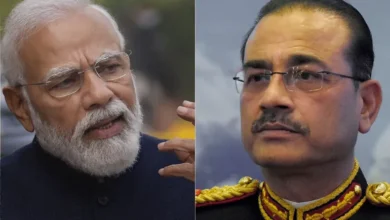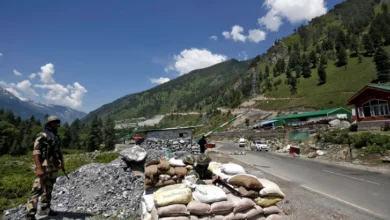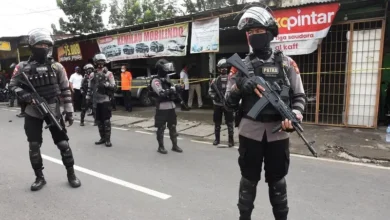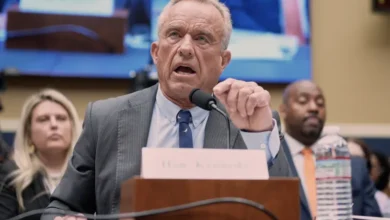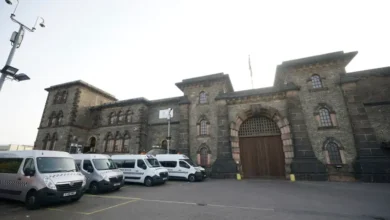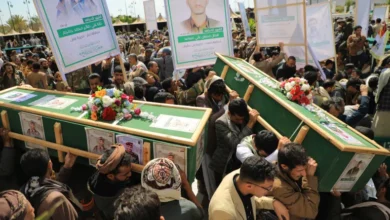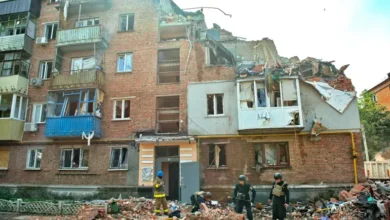Has Gabon’s ‘all-powerful’ Bongo dynasty really lost its 55-year grip?
But the military government’s new leader, General Brice Clothaire Oligui Nguema, is Bongo’s own cousin and commander-in-chief of the Gabonese Republican Guard – the country’s most powerful security force.
Francois Conradie, a political analyst at Oxford Economics, noted that the events unfolding might be the result of internal tensions among Gabon’s elites and extended Bongo family members.
“There are a lot of reasons to think that the coup was the wider elite in Gabon preserving itself by getting rid of the very narrow elite made up of Ali Bongo, his son Noureddin and his wife Sylvia,” he said.
Voting in Saturday’s election was conducted under an internet shutdown, while the arrests of local election monitors were decried by the opposition as fraudulent. A series of last-minute legislative rules also favoured Bongo’s party. When the results were announced, Gabon’s electoral body said Bongo had won 64 percent; his main rival Albert Ondo Ossa won 30 percent.Gabonese “were going to protest for a recount of the votes and make so much noise and international focus”, Conradie explained, saying that Nguema understood this.
The general came up through the ranks of Bongo’s inner circle, and some experts believe the power grab was an attempt to thwart public protest plans that were brewing in support of Ossa.
“Is this coup really marking the end of the Bongo dynasty or are we just seeing the latest rivalry between different factions of the Bongo family?” questioned Maja Bovcon, a senior Africa analyst at consultancy firm Verisk Maplecroft.Their path to power began when Bongo’s father Albert-Bernard (Omar) was backed by France to take over as president in December 1967 following the death of the country’s independence leader Leon Mba, who succumbed to cancer after being bolstered back into power following a coup in 1964.
The elder Bongo won a series of elections under claims of electoral rigging; he removed the country’s run-off system, and replaced it with single-round voting. For years, Omar imposed a one-party system. Gabonese authorities claimed he won 100 percent of the vote in a 1986 presidential election, with an apparent 99.9 percent voter turnout.
The central African nation’s oil wealth was recirculated among the elite to ensure loyalty. Omar’s regime extended Bongo family jobs into the military, parliament and state commerce. The current president of the constitutional court, Marie-Madeleine Mborantsuo was Omar’s former lover.
France became a close ally under a system known as Francafrique, in which French corporations maintained good relations with African politicians in order to benefit from lucrative resource deals.
A French police investigation in 2007 found the Bongo family owned 39 properties in France, 70 bank accounts, and nine luxury cars worth a total of 1.5 million euros. At the time, lawyers disputed those assets were acquired through his 20,000 euro-per-month salary. According to the United States Senate, Omar reportedly moved $100m (PDF) in suspect funds through a New York Citibank account from 2003 to 2007.
Conradie said that for many years the Bongos invested money into French politics.Parisian lawyer, Robert Bourgi, who advised former French president Jacques Chirac and his prime minister Dominique de Villepin claimed he had been allegedly handed $20m in cash from five African heads of state, including Omar, to support Chirac’s election campaign. Paris prosecutors dropped an investigation into the claims due to lack of evidence.What kept the Bongos in power?
Ali Bongo had sought to start a new chapter when he took over following Omar’s death in 2009. Bongo had previously served as foreign minister and defence minister, and had started to distance himself from France.
Ali Bongo’s wife Sylvia and son Noureddin Bongo Valentin started to spend more time in London than they spent in Paris. “Gabon recently became a [British] Commonwealth member,” said Bovcon. His policies around environmental conservation made him a respectable Western ally.
But oil riches continued to flow within Bongo’s inner circle. Last year, French authorities indicted nine of Omar Bongo’s 54 children for fraudulently benefitting from at least 85 million euros ($92m) worth of real estate.
Each of Bongo’s three election wins has been highly disputed. Protesters set fire to the country’s parliament building after his re-election in 2016. Even then, his main rival was his former brother-in-law Jean Ping, a half-Chinese diplomat who previously held high-ranking posts within the elder Bongo’s cabinet. Ping had two children with Omar’s daughter Pascaline, also a government minister.
Many questioned Bongo’s fitness to lead after a serious stroke in 2018. He wasn’t seen publicly for nearly a year. But he began making political changes after a failed coup attempt in 2019. He sacked his sister Pascaline from her role as high representative of the head of state, and sidelined his half-brother Frederic Bongo as head of state to military attache in South Africa. Brice Laccruche Alihanga, a high-ranking French-Gabonese was arrested and sentenced to five years in prison in 2021 in what Bongo framed as a crackdown on corruption.
“Laccruche Alihanga used to be a very influential chief of staff but because he reportedly showed too much ambition during Ali Bongo’s recovery period he was then charged over corruption allegations and put in jail,” explained Bovcon. After Laccruche’s removal, Bongo appointed his eldest son Noureddin as his aide, with the title of coordinator of presidential affairs.
The Bongo family stayed resilient to the military coups happening elsewhere in Africa by buying off opponents and moving relatives into strategic positions. Yet Bongo’s attempts to coup-proof his cabinet may have helped hand power to Nguema. In 2009 when Bongo took over from his father, he had dismissed Nguema who was an assistant to the late president. But following the 2019 coup attempt, Nguema, who had been serving as an attache to the Gabonese embassies in Morocco and Senegal was brought back and promoted to head of the Republican Guard.
Why this coup is different
Pro-democracy groups accused Bongo, 64, of turning the presidency into an inheritance.
For years, “Omar Bongo’s various grandchildren have been unhappy in the way that Noureddin Bongo has become more prominent,” said Conradie.
According to Conradie, “part of the Bongo clan is happy with the coup and maybe understood the wisdom of not having someone with the surname Bongo too closely involved”.
On Wednesday, crowds took to the streets of Libreville, the Gabonese capital, to rejoice in the end of the Bongo dynasty, yet experts suggested the elite are well entrenched in the political system.
“Even though Gabon has one of the highest GDPs (gross domestic product) per capita in Africa, unemployment levels are still high,” said Bovcon. The country of 2.4 million people remains poor.
Almost 40 percent of people aged 15-24 are out of work, according to the World Bank’s 2020 figures. Like other longtime rulers, Bongo violently curtailed dissent and press freedom.
According to a 2020 investigation by the Organized Crime and Corruption Reporting Project (OCCRP) on the Bongo family’s assets in the United States, Nguema invested in real estate, paying in cash.
Some saw the 2023 election as the first time the Bongo family faced a challenger that wasn’t a quasi-relative. But within a coup, the extended Bongo family may have managed to resurrect itself.

